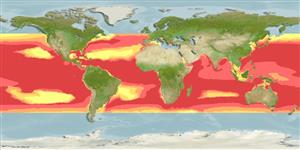Preferred temperature (Ref.
115969): 11.5 - 27.3, mean 22.4 (based on 477 cells).
Phylogenetic diversity index (Ref.
82804): PD
50 = 0.7505 [Uniqueness, from 0.5 = low to 2.0 = high].
Bayesian length-weight: a=0.00427 (0.00256 - 0.00710), b=3.11 (2.96 - 3.26), in cm Total Length, based on LWR estimates for this species & (Sub)family-body (Ref.
93245).
ระดับชั้นอาหาร (Ref.
69278): 4.5 ±0.3 se; based on diet studies.
ความสามารถในการกลับคืนสู่ปกติ (Ref.
120179): ขนาดกลาง, เวลาต่ำสุดที่จะทำให้ประชากรเพิ่มขึ้นเป็น 2 เท่าใช้เวลา 1.4 - 4.4 ปี (K=0.1-0.3).
Prior r = 0.44, 95% CL = 0.29 - 0.66, Based on 6 full stock assessments.
Fishing Vulnerability (Ref.
59153): Moderate to high vulnerability (52 of 100).
Climate Vulnerability (Ref.
125649): Moderate to high vulnerability (50 of 100).
